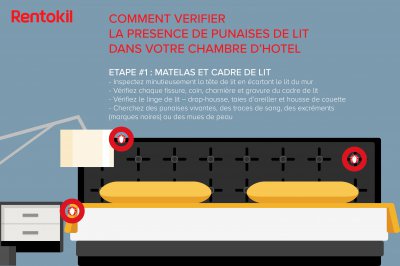Rentokil shares its knowledge by organizing several meetings during the year with the professionals of the hotellerie de France on the theme of the impact of bed bugs in hotels. Rentokil France, a subsidiary of Rentokil Initial Plc, a global leader in pest control and control, operates with professionals and private individuals in more than 60 countries around the world.
Our activities focus on meeting the needs of all types of pests, to ensure a better daily life for our customers. Since the late 1990s, bed bugs have returned in strength but the reasons for this upsurge are not clearly identified. Factors such as increased international travel and the emergence of insecticide resistance have probably contributed to the spread of infestations.
According to the World Tourism Organization, international tourist arrivals reached 1 billion 181 million In 2015, an increase of 4.4% compared to the previous year. For 2016, UNWTO forecasts growth of around 4% globally. It is in this context that the bedbug phenomenon affects all major French urban centers: 1 in 4 hotels in Paris has at least one room infested every year and many cities such as Strasbourg are experiencing a recent proliferation of these pests.
Many areas are likely to be infested: the hospitality industry, the medico-social sector, crèches and schools (dormitories), stores (dressing rooms) and private homes.
Bed bug infestation causes Many consequences on the activity of an establishment:
- The impression of bad hygiene creating a very negative impact on the brand image
- Source of disputes more or less important (request for change of room, reimbursement, Medical expenses / hospitalization)
- Negative opinions are mostly relayed on the media / websites (ex: TripAdvisor)
Preventive recommendations
A company must apply itself to controlling the risk of infestation from the start, so that no Harmful to the point of infestation. Based on an Integrated Pest Management (IPM) approach, Rentokil is based on the following five factors, regardless of sector:
1. Inspection - helps to understand and better understand the presence of pests in the environment.
2. Exclusion - eliminate entry opportunities, block spaces, seal doors, windows and open areas to stop infestation of critical areas of the business
3. Restriction - knowledge and awareness of pests and Training for staff to help them identify signs of pest activity or early signs of entry, eliminate access to food and eliminate any place of refuge in prohibited areas.
4. Destruction - includes innovative and effective solutions to effectively eradicate existing infestations by professional and trained technicians.
5. Monitoring - ensure regular monitoring to detect early warning signs of pest activity and use monitoring devices that show early signs of activity, allowing for rapid response so that the impact on the business Be kept to a minimum and stop the infestation as soon as possible.
